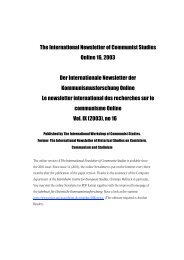Vol. XIII (2007), no 20 - The International Newsletter of Communist ...
Vol. XIII (2007), no 20 - The International Newsletter of Communist ...
Vol. XIII (2007), no 20 - The International Newsletter of Communist ...
Erfolgreiche ePaper selbst erstellen
Machen Sie aus Ihren PDF Publikationen ein blätterbares Flipbook mit unserer einzigartigen Google optimierten e-Paper Software.
<strong>The</strong> <strong>International</strong> Newletter <strong>of</strong> <strong>Communist</strong> Studies Online <strong>XIII</strong> (<strong><strong>20</strong>07</strong>), <strong>no</strong> <strong>20</strong> 109<br />
On 23 <strong>of</strong> December 1929, the Eastern Secretariat <strong>of</strong> the ECCI in Moscow sent directives to<br />
the Central Committee <strong>of</strong> the German <strong>Communist</strong> Party (KPD), instructing them that LAI<br />
needed more “attention and support” by the communists in Germany, and urging the KPD to<br />
<strong>no</strong>minate a “reliable Comrade” to work at the German Section <strong>of</strong> the League. 177 Two months<br />
earlier, on October <strong>20</strong>, 1929, Bohumir Smeral, Comintern emissary and Czechoslovakian<br />
communist, arrived in Berlin in order to overtake the position as Secretary <strong>of</strong> the<br />
<strong>International</strong> Secretariat in Berlin. From that moment on, the League had three Secretaries;<br />
the other two were Münzenberg and Virendranath Chattophadyaya (a national revolutionary<br />
from India, better k<strong>no</strong>wn as Chatto). 178 Smeral’s appointment had been decided by the Small<br />
Commission in Moscow, a decision causing anger and frustration among the actors in Berlin,<br />
especially Chatto, forcing him to respond to the Small Commission that “we should only be<br />
adding a superfluous, superficial politician … instead <strong>of</strong> comrades with real k<strong>no</strong>wledge <strong>of</strong> and<br />
connections in the colonies”. 179 After Smeral had monitored the activity at the <strong>International</strong><br />
Secretariat, the first confidential report was sent to Moscow on January 2, 1930, in which he<br />
stated that the League was in a “situation <strong>of</strong> crisis”. Smeral claimed that the situation at the<br />
Secretariat had deteriorated in so far as <strong>no</strong>w the question was to keep LAI alive. Only by<br />
reorganising the LAI could it remain active, with a new political platform, that is, as an<br />
organization promoting a more aggressive national revolutionary rhetoric, with the systematic<br />
assistance from the Eastern Secretariat in Moscow, the WEB in Berlin, and European<br />
<strong>Communist</strong> Parties suggested Smeral. 180<br />
Moscow responded to Smeral’s suggestions about a month later. <strong>The</strong> ECCI Political<br />
Secretariat in Moscow on February 16, 1930, sent new directives and suggestions to the<br />
Central Committee <strong>of</strong> the <strong>Communist</strong> Party <strong>of</strong> France (CPF), concerning a re-organisation <strong>of</strong><br />
the LAI. Apart from organisational measures, the Political Secretariat expressed its view on<br />
the LAI and its future as a <strong>no</strong>n-party organization, promoting a distinct and clearly articulated<br />
anti-imperialist agenda. Moscow “emphasize[d], that a <strong>no</strong>n-party organization, like the LAI,<br />
at the moment [struggling] in the III Period <strong>of</strong> the Post-war Capitalism” was without a doubt a<br />
central organization. Since the LAI was <strong>no</strong>t restricted, since it was <strong>no</strong>t perceived as a “pure<br />
<strong>Communist</strong> <strong>International</strong> organization” according to the Political Secretariat, it could act as a<br />
<strong>no</strong>n-party organization, a crucial modus operandi as the liberation struggle in the colonial and<br />
semi-colonial world was growing at an increased speed. <strong>The</strong>refore, Moscow had taken in<br />
regard other <strong>no</strong>n-party organizations, steaming from the Comintern apparatus <strong>of</strong> relief and<br />
front organizations, for example IAH, <strong>International</strong>e Rote Hilfe (IRH, in English: <strong>International</strong><br />
Red Aid, IRA, Russian acronym: MOPR), Friends <strong>of</strong> the Soviet Union, and the Anti-Fascist<br />
177<br />
BArch SAPMO I 6/3/198, pp. 1-3, Confidential directives from the Eastern Secretariat <strong>of</strong> the ECCI in<br />
Moscow to Central Committee <strong>of</strong> the KPD, 23/12-1929.<br />
178<br />
See Nirode K. Barooah’s extensive biography on Chatto in Chatto – <strong>The</strong> Life and Times <strong>of</strong> an Indian<br />
Anti-Imperialist in Europe (Oxford, <strong>20</strong>04).<br />
179<br />
BArch SAPMO R 1507/279, pp. 79-93, Betrifft: Durchsuchung der Räume der ”Liga gegen den<br />
Imperialismus”, Berlin, 19/8-1932; RGASPI 542/1/30, pp. 104-106, Letter from Chatto in Berlin to the<br />
Small Commission in Moscow, 14/10-1929. <strong>The</strong> decision to send Smeral to Berlin was taken by the Small<br />
Commission, 28/9-1929. For biographical information on Smeral see Branko Lazitch & Milorad M.<br />
Drachkovitch, Biographical Dictionary <strong>of</strong> the Comintern (Expanded Edition), Stanford University, 1986,<br />
p. 433.<br />
180<br />
RGASPI 542/1/39, pp. 5-11, Letter from Smeral in Berlin to unk<strong>no</strong>wn receiver in Moscow, 2/1-1930.














